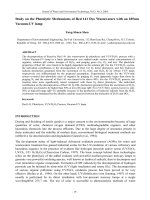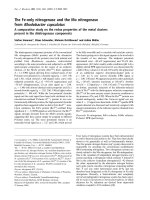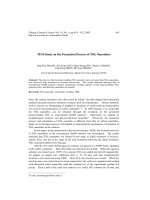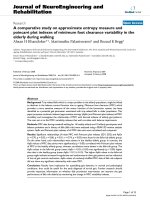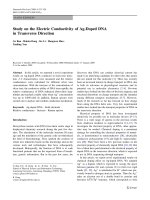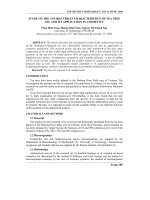Study on the elements that affect the buying decision of milk bottle DR brown in new generation company limited
Bạn đang xem bản rút gọn của tài liệu. Xem và tải ngay bản đầy đủ của tài liệu tại đây (708.21 KB, 33 trang )
RESEARCH PROJECT
(BMBR5103)
STUDY ON THE ELEMENTS THAT AFFECT THE BUYING
DECISION OF MILK BOTTLE “DR. BROWN” IN NEW
GENERATION COMPANY LIMITED
Research Proposal
STUDENT’S FULL NAME
: Ly Vinh Kien
Huynh Pham Ngoc Lam
INTAKE
: May 2012
ADVISOR’S NAME & TITLE
: Dr. Ut Tran
October 2013
ID# 2448464
ID# 2448452
Business Research Method
Open University Malaysia
HUTECH Campus
Instructor: Dr. Ut Tran
Advisor’s assessment
....................................................................................................................................................................
....................................................................................................................................................................
....................................................................................................................................................................
....................................................................................................................................................................
....................................................................................................................................................................
....................................................................................................................................................................
....................................................................................................................................................................
....................................................................................................................................................................
....................................................................................................................................................................
....................................................................................................................................................................
....................................................................................................................................................................
....................................................................................................................................................................
....................................................................................................................................................................
....................................................................................................................................................................
....................................................................................................................................................................
....................................................................................................................................................................
....................................................................................................................................................................
....................................................................................................................................................................
....................................................................................................................................................................
....................................................................................................................................................................
....................................................................................................................................................................
Advisor’s signature
Students: Lý Vinh Kiên
Huỳnh Phạm Ngoc Lâm
Class : OUM MBA 0512-1C
Page 1
Open University Malaysia
HUTECH Campus
Business Research Method
Instructor: Dr. Ut Tran
STUDY ON THE ELEMENTS THAT AFFECT THE BUYING DECISION OF MILK
BOTTLE “DR. BROWN” IN NEW GENERATION COMPANY LIMITED
Students: Lý Vinh Kiên
Huỳnh Phạm Ngoc Lâm
Class : OUM MBA 0512-1C
Page 2
Open University Malaysia
HUTECH Campus
Business Research Method
Instructor: Dr. Ut Tran
EXECUTIVE SUMMARY: ........................................................................................... 4
I. INTRODUCTION ..................................................................................................... 5
1.1.
Research Background. ............................................................................................................ 5
1.2.
Problem Statement .................................................................................................................. 5
1.3.
Research Objectives and the Scope of the Research ............................................................... 6
II. LITERATURE REVIEW .......................................................................................... 7
2.1 Research definition (operational definition of key words) ........................................................... 7
2.2 Related research .......................................................................................................................... 10
2.3 Related Model in an analysis ...................................................................................................... 13
III. CONCEPTUAL FRAMEWORK ............................................................................ 15
IV. HYPOTHESIS AND OPERATIONAL DEFINITION .............................................. 16
V. Methodology ....................................................................................................... 17
1.
Type of research choice ............................................................................................................ 17
2.
Research design ........................................................................................................................ 18
3.
Estimated budget of the research .............................................................................................. 21
4.
Activity plan: ............................................................................................................................ 22
5.
Conclusion ................................................................................................................................ 22
REFERENCES ........................................................................................................... 23
Students: Lý Vinh Kiên
Huỳnh Phạm Ngoc Lâm
Class : OUM MBA 0512-1C
Page 3
Open University Malaysia
HUTECH Campus
Business Research Method
Instructor: Dr. Ut Tran
EXECUTIVE SUMMARY:
Due to the economic recession, all enterprises are facing with the income and
benefits, our company also face those problems too. We would to make research on “The
elements that affect the buying decision of milk bottle “Dr. Brown” in New Generation
Company Limited” to discover the elements and give the solutions for those problems.
The research is processed by 2 phases: preliminary research with the peer interview to
discover the elements affecting on Dr Brown milk bottle buying decisions and the official
research with the 100 samples to find out the elements. in addition, we can use more
descriptive statistics, EFA, Cronbach alpha to make our research more clearly .In the
limitation of research, the researchers are only the references and it also helps to find
solutions of business activities and distribution products efficient. The research will be
arranged as following
EXECUTIVE SUMMARY:
I. INTRODUCTION
II. LITERATURE REVIEW
III. CONCEPTUAL FRAMEWORK
IV. HYPOTHESIS AND OPERATIONAL DEFINITION
V.METHODOLOGY
REFERENCES
APPENDICES
Students: Lý Vinh Kiên
Huỳnh Phạm Ngoc Lâm
Class : OUM MBA 0512-1C
Page 4
Open University Malaysia
HUTECH Campus
Business Research Method
Instructor: Dr. Ut Tran
I. INTRODUCTION
1.1.
Research Background.
The world economy has tendency of being in risk. The weaker domestic demand and
slower growth in several countries cause the import and export to slow down. The New
Generation Company is an importer of milk bottle products from USA which were also
affected by those changes in the world economy today.
The sales situation of this product line is being decreased since the first quarter this
year while inventory increased. There must be several key reasons for that. Therefore, this
research will be focused solely on identifying the causes of that situation, and then offering
some suggestion to overcome the difficulties and get the business back on track.
1.2.
Problem Statement
1.2.1 Main Problem
The sales volume status and profit of this milk bottle product “Dr. Brown” are
decreasing since 1st quarter 2013. It caused the company fail to obtain the goals.
1.2.2 Sub –Problems:
a. The price of Dr. Brown milk bottle is no match against competitors. It is quite high
in comparison with the other milk bottle products in the market. According to Mankins
(2005) concluded that the quantity demanded falls when the price rises and the quantity
demanded rises if the price falls, and the quantity demanded is negatively related to the price.
He also proposed the law of demand “Other things equal, when the price of a good rises, the
quantity demanded of the good falls”
b. Brand awareness: More competitive products with unknown origin appear on the
market which affected the customer’s brand awareness against the milk bottle products of
New Generation Co., Ltd. Brand awareness has great influences on buying purpose from the
customers who intend to pay money for well-known product (Keller, 1993; Macdonald &
Sharp, 2000).
c. Advertising is not good and attractive. Due to the change of advertising budget, the
advertising methods are changing so much, the managers does not make advertisement in the
retail shop, but they did in the small website column . Mohamad et al (2013) used the
multiple regression analysis and applied Pearson correlation to examine the connection
Students: Lý Vinh Kiên
Huỳnh Phạm Ngoc Lâm
Class : OUM MBA 0512-1C
Page 5
Open University Malaysia
HUTECH Campus
Business Research Method
Instructor: Dr. Ut Tran
between the advertising and buyer decision making, and they conclude that there is relation
between two variables.
d. Customer satisfactions play an important role in the business. The customers feel
that the new milk bottle 240 ml is not satisfied because there is leak of milk from the milk
bottle neck and the customers feel very annoying when they feed the milk to their babies and
they expect that the milk bottle will be design better at the milk bottle’s neck. Besides,
Murekio (2010) uses the revenue data, and customer satisfaction survey data in ten retails
center in Nairobi, she concludes that there is significant relationship between the customer
satisfaction and the revenue in 10 retail center.
e. Personal factors: The current economic recession is presently a source of concern
for marketers’ attempts to determine the current buying behaviors of the consumers,
consumers are changing their buying behaviors and greatly decreasing there overall spending.
According to Armstrong & Kotler (2009) proposed that if economic indicators point to a
recession, marketers can take steps to redesign, and reprise and their product closely, they
also concludes that a person’s economic situation such as personal income, savings, and
interest rates will influence their product choices in the store.
If not being reviewed and reacted properly, this problem may get worse:
-“Dr. Brown” milk bottle manufacturing line may have to declined or shut down due
to overstock
-Inventory of milk product increases and unusable.
-Workers of this manufacturing line might lose their jobs, increase unemployment
-The company competitive position will suffer damage.
1.3.
Research Objectives and the Scope of the Research
1.3.1 Research Objectives
This research is to identify the important aspects which affect the buying decision of
milk bottle’s consumers within Ho Chi Minh City area, Vietnam, in 2013. Base in the
information found, we will suggest the solutions for improving buying decisions and the sales
revenue of Dr. Brown milk bottle product in New Generation Company Limited.
Despite some limitations, the study results are considering valuable references; we
would like to offer useful solutions to enhance the product recognition and its sales.
1.3.2 The scope of the proposed research?
Students: Lý Vinh Kiên
Huỳnh Phạm Ngoc Lâm
Class : OUM MBA 0512-1C
Page 6
Open University Malaysia
HUTECH Campus
Business Research Method
Instructor: Dr. Ut Tran
The research is intended of making the research of the element affecting on buying
decision in New Generation Company and finding the solution to resolve the low sale and
profit
1.3.3 Limitation of the research
The proposed research is limited on the mother and children shops in Ho Chi Minh
City area, we also narrow the target customers’ income to over 7 million VND, assuming the
retailers average purchase volume is 10 million VND per month.
The research is conducted within Ho Chi Minh City, so the result is not intended to be
used and compared in any other areas due to geographic differences.
The research is limited to baby product market in Ho Chi Minh city, Vietnam. It will
only look at the market share and competitions that may affect Dr.Brown milk bottle product
directly. It may use other similar products such as baby care, toys, baby medical products etc.
as references for analysis, but should not consider them as key factors for comparison. It also
should not refers and mention other product lines of New Generation Co., Ltd.
1.3.4
Research significance
Once completed, the research can help the management of New Generation Co., Ltd
realizing the situation and prepare a clear strategy for future business of this milk bottle
product line. It also may help the consumers to be aware of how important it is to choose an
appropriate baby product.
II. LITERATURE REVIEW
2.1 Research definition (operational definition of key words)
1. Consumer behavior: Cook (2009) conclude that consumer behavior is described in
this way: set of activities is directly achieved, use and disposal of goods and services.
2. Buying decision process: Engel et al., (1986) suggest that high involvement with a
product results in which starts with problem recognition, an information search, alternative
evaluation, purchase, and post purchase activities.
3. Customer satisfaction: According to Blackwell, Engel & Miniard (2006), there are
three major factors of satisfaction such as product performance, consumption feelings, and
Students: Lý Vinh Kiên
Huỳnh Phạm Ngoc Lâm
Class : OUM MBA 0512-1C
Page 7
Business Research Method
Open University Malaysia
HUTECH Campus
Instructor: Dr. Ut Tran
expectations. The study showed that building customer satisfaction resulted in better returns
to companies (Reichheld, 1996)
4. Price acceptability: Herrmann, Huber & Wricke (2001) and Homburg, Hoyer &
Koschate (2005) stated that consumer satisfaction has a positive relationship with price
acceptability and readiness to pay. From that research, these author want to say that higher
consumer satisfaction will make higher price acceptance and readiness to pay and low
price
sensitivity
appear.
In contrast, a low consumer satisfaction will affect price
acceptance and readiness to pay positively, and make price sensitive in high level
5. Advertising: Moschis and Mitchell proposed that the effect of TV advertising and
interpersonal influences and social structured on family consumption decisions. Batra et al.
(1995), the effectiveness of advertising is considered for the effects on sales in the short term.
6. Brand awareness: Brand awareness is essential because consumers remind the
brand in the time of a specific product, and the brand will be a part of the mindset. Awareness
can also effect on consumer decision making by influencing brand associations that create the
brand image (Keller, 1998).
A brand name gives a characteristic which leads the retailers and consumers to find
out service providers and expect the outcomes of the services. Kan (2002) suggests the brand
awareness can make to increased profitability evaluation. Brand awareness has great
influences on buying purpose from the customers who intend to pay money for well-known
product Keller (1993); Macdonald & Sharp (2000). Addition, Nazia et al (2011) use the
regression to test on 200 retailers on two brands i.e. L’Oreal and Ganiers with 3 variables
brand awareness and perceived quality, customer loyalty. They concluded that the study was
brand awareness significantly influences the profitability.
7. Personal factor: Linehan and Cadogan (2000) conclude that personal factors
influence buying decisions such as economic, age, gender, occupation, and lifestyle.
Armstrong and Kotler also has similar opinions and argued that if people with a good secure
job and income, have the tendencies of buying more expensive and even luxury product,
where people with less income and less secure jobs tend to buy cheaper products.
8. Brand loyalty: Chaudhuri & Holbrook (2001) said that brand loyalty has the
relationship with brand price. In addition Aaker (1996) shows that price is the first sign of
brand loyalty. In addition, Aaker also emphasized that Price premium is distinguished as
a customer is willing to pay for the brand loyalty in comparison with another brand which
Students: Lý Vinh Kiên
Huỳnh Phạm Ngoc Lâm
Class : OUM MBA 0512-1C
Page 8
Open University Malaysia
HUTECH Campus
Business Research Method
Instructor: Dr. Ut Tran
bring the same benefits, but the benefit can be bad or good factors which are dependent on
the 2 brands in a group of comparisons.
9. Package design: According to Stewart (2007), packaging design skill is
communicating design thinking effectively. He defines the elements of design as: material
choices, color, text, photography and illustration. According to Sustainable Packaging
Coalition (SPC), strategies for sustainable packaging design are:
package Design for
sustainability , transport environmental best practices .
However, Soroka (2002) proposed that packaging is the combination of the science,
technology, art and fashion to protect and keep the products to customers. Variawa (2010)
analyzed the effects of packaging on decision making process of Consumer Goods in retail
shopping.
10.Supplier : Keeping good relationships with suppliers is recognized as an
impressive factor in sustaining a competitive advantage (Stevenson 2009:525).
11. Buying decision: Sproles and Kendall (1986) proposed that buying decision is
also having related a confused over choice form the customers. They feel very confusing
when they choose suitable product because it’s over choice.
12. Supplier-manufacturer relationship: Michael Maloni and W.C. Benton (1999), in
their research stated that the power source of the supplier, once overrun the manufacturer,
could affect their relationship and damage the business of the manufacturer.
13 Mothers’ communication orientation and consumer socialization: Carlson,
Grossbart and Walsh (1990) explored that mothers’ communication orientation and consumer
socialization have the close relationship tendencies on buying decision
14. Need Recognition: Neal and Questel (2006) stating that need recognition occurs
due to several factors such as personal, professional and lifestyle which ead to formation of
idea of purchasing.
15. Information search: Schiffman and Kanuk (2007) stated that consumer finds
information related to desired product
16. Evaluation of alternatives: Kotler and Keller (2005) consider this stage as one of
the important stages as the consumer considers when they take into account the factors such
as size, quality and price.
17. Purchase decision made: Kacen (2002) stated purchasing decision can be divided
into planned purchase
Students: Lý Vinh Kiên
Huỳnh Phạm Ngoc Lâm
Class : OUM MBA 0512-1C
Page 9
Open University Malaysia
HUTECH Campus
Business Research Method
Instructor: Dr. Ut Tran
18. Post-purchase evaluation: Neal et al (2004) proposed that the important process in
the consumer decision making process when it makes the influences on the consumers’
purchases of the same product or service from the same supplier
19. Internal search refers to the process where consumers rely on their personal
experiences and believes (Rose and Samouel, 2009).
20. Life style: Due to Morganosky (1986). He states that Life style in relation to the
purchase of different consumer products, shopping behavior, retail behavior and online
purchasing behavior were also found in the consumer literature
21. Self-concept: Self-concept is another factor affecting consumer decision-making.
It is defined as “the totality of the individual’s thoughts and feelings having reference to
him/herself as an object (Rosenberg, 1979)
22. Social factor : Kim et al (2002) concluded consumers product choice for a brand
are affected by a social influence, and Linehan and Cadogan (2000) proposed that social
factor also influence on consumers behavior, like family, peer group
23. Psychological factor: Armstrong & Kotler (2009) proposed that person’s buying
decisions are influenced by motivation attitude and perception.
24. Personal value: Rokeach (1973) and Kahle (1983) proposed that a personal value
is an enduring belief that a specific end-state of existence or specific mode of conduct is
preferred over others.
25 Purchasing strategy segments: Blattberg, Gary, and Joshua (1981) conclude
purchasing strategy segments based on three purchase areas: brand loyalty (single brand
many brands), type of brand preferred (national, national and private label), and price
sensitivity (regular price, deal price).
2.2 Related research
2.2.1 Kotler’s Consumer decision -making process
In the process of buying decision, Kotler (2003) stated that the consumers always go
through 5 steps: problem recognition, information search, and evaluation of alternative,
purchase decision, post purchase evaluation. It showed that the process of buying has
been formed for a long time and it also stretches for long time after the customers sell
the products
Students: Lý Vinh Kiên
Huỳnh Phạm Ngoc Lâm
Class : OUM MBA 0512-1C
Page 10
Business Research Method
Open University Malaysia
HUTECH Campus
Problem
recogniti
on style
Information
search style
Instructor: Dr. Ut Tran
Evaluation
of
alternative
Purchase
decision
Post
purchase
evaluation
Figure 1 Kotler’s Consumer decision -making process
From this model, it implies that the buyers must go through 5 steps when they buy the
products. Actually, it is not true in real life; the buyers can eliminate one steps or steps
when buying the goods
2.2.2 Kotler's model of stimulus response of buyer behavior
Figure 2 Kotler's model of stimulus response of buyer behavior
The consumer’s personal characteristics will illustrate in order to stimulate the buying
decision and help the company classifying the buyers due to the way of buying, and assist the
marketing ways implementing better. The characteristics include:
-Social: family and reference groups
-Personal: age & lifecycle stage, economic circumstances and lifestyle
-Psychological: Beliefs, perception, attitudes and motivation
2.2.3 Sproles and Kendall research
Students: Lý Vinh Kiên
Huỳnh Phạm Ngoc Lâm
Class : OUM MBA 0512-1C
Page 11
Open University Malaysia
HUTECH Campus
Business Research Method
Instructor: Dr. Ut Tran
Sproles and Kendall concluded that the decision making is the basic consumer personality.
The model is consisted of 8 elements: Perfectionism consciousness, brand consciousness,
novelty and fashion consciousness, recreational and hedonistic consciousness, price and value
consciousness, impulsiveness and carelessness, confused by over choice, habitual and brand
loyal
Perfectionism
consciousness
Brand consciousness
Novelty and fashion
consciousness
Consumer decision making style
Recreational and
hedonistic consciousness
Price and value
consciousness
Impulsiveness and
carelessness
Confused by over choice
Habitual and brand loyal
Figure 3 Sproles and Kendall‘s Consumer decision making style
Students: Lý Vinh Kiên
Huỳnh Phạm Ngoc Lâm
Class : OUM MBA 0512-1C
Page 12
Open University Malaysia
HUTECH Campus
Business Research Method
Instructor: Dr. Ut Tran
2.3 Related Model in an analysis
2.3.1 Model of Phuoc’s research proposal
According to Bharadwaj (2004), there are 4 elements which effects on buying decision
such as quality, delivery, price, service. In addition, Nguyen Kim Phuoc (2007) analyses
the research of Lehman and O’Shaughnessy (1974).
Kelly and Coaker (1976), Demssey (1978), he concluded with four criteria: delivery –
quality – price, guarantee system, technology ability, implementation ability which are
popular and analyses and validated in the past research. From that synthesis, Phuoc uses
them into applying his research proposal on the topic: the elements affecting buying
decision of A4 printing paper in the state enterprise, private enterprise, foreign company
in Ho Chi Minh City. In her research, she does not pay much attention quality of A4
Printing Paper; the quality also plays an important factor which causes the effect of
buying decision.
Delivery
Quality paper
Price paper
Buying decision of A4
printing paper
Guarantee paper
system
Technology ability to
make good paper
Figure 4 Phuoc’s model of buying decision of A4 printing paper
2.3.2 Kwan’s model research proposal
Students: Lý Vinh Kiên
Huỳnh Phạm Ngoc Lâm
Class : OUM MBA 0512-1C
Page 13
Business Research Method
Open University Malaysia
HUTECH Campus
Instructor: Dr. Ut Tran
Besides, according to Kwan Chui Yan (2006) , she made the PhD thesis on the factor
affecting young Chinese consumers’ decision making behaviors towards casual wear
purchase to observe the decision making styles existing in young Chinese choices of
casual wear and check the relationship between decision making styles and the others
factors. In addition, she gives the model which comprises of 4 major elements including
consumer individual characteristic (personal values, life style characteristics, selfconcept, and fashion involvement), environmental characteristics (social factor and
culture factor, clothing choice criteria and consumer decision-making styles
To me, the research of Kwan Chui Yan has limitations which he choose the area of
research so large and diversifies, because the Hong Kong, Taiwan and China also share
the same culture, but taste of life style are also different due to the different incomes in 3
areas. To my research, I would like to make the limitation; I only focus on the Ho Chi
Minh City with average income customers.
Individual characteristics:
Environmental characteristics:
Personal values
Social factor
Lifestyle characteristics
Cultural factor
Self-concept
Fashion involvement
Clothing choice criteria
Consumer decision making styles
Figure 5 Kwan’ model of Consumer decision making styles
Students: Lý Vinh Kiên
Huỳnh Phạm Ngoc Lâm
Class : OUM MBA 0512-1C
Page 14
Business Research Method
Open University Malaysia
HUTECH Campus
Instructor: Dr. Ut Tran
III. CONCEPTUAL FRAMEWORK
The model is designed on the retail buying theory and former research at 2.3 about the
elements affecting on buying decision and the distinguished elements of baby products such
as milk bottle, we will process the model as follow
Customer satisfaction
The
H1
Price
H2
buying
decision
milk
of
bottle
Suggested solutions
“Dr. Brown”
Advertising
H3
H4
Brand awareness
in
New
Generation
Company
Limited
Dependent Variable
H5
Personal factors
Independent Variables
Figure 6: The Theoretical Framework buying decision of milk bottle “Dr.
Brown” in New Generation Company Limited
The model is consisted of 5 basic elements: Customer satisfactions, Price, advertising, Brand
awareness, and Personal factors. They are considered as independent variables. The core
component and the major dependent variable of the framework is the last componentconsumer decision making. The purpose of the study (as mentioned above) is to find out the
relationship between independent variables and dependent variable.
Students: Lý Vinh Kiên
Huỳnh Phạm Ngoc Lâm
Class : OUM MBA 0512-1C
Page 15
Open University Malaysia
HUTECH Campus
Business Research Method
Instructor: Dr. Ut Tran
IV. HYPOTHESIS AND OPERATIONAL DEFINITION
Operational definitions are instrumental in determining the exact process by which
research data should be collected and processed. Because operational definitions outline how
data will be measured, we can know the elements that affect the buying decision of milk
bottle “Dr. Brown” in New Generation Company. In addition, we would like to give the
definition of 6 variables. According to Wikipedia; all the definitions are given as following:
Customer satisfaction, a term used in marketing, is a measurement of how products
and services supplied by a company adapt and give to customer expectation.
Price refers to the quantity of payment settled by a seller of goods or services, rather
than the eventual payment amount
Advertising or advertising is a form of communication for marketing and used to
encourage, support, an audience such as viewers, readers or listeners; a specific group to
continue some new action.
Brand Awareness is the extent which a brand is known by potential customers, and is
associated with a distinguished product.
Personal factors help us understand the buying tendencies and spending actions of
consumers.
The following hypothesis was tested in this study as following:
Hypothesis 1: There is a positive relationship between customer satisfaction and the buying
decision of Dr.Brown milk bottle product
Hypothesis 2: There is a positive relationship between Price and the buying decision of
Dr.Brown milk bottle product
Hypothesis 3: There is a positive relationship between Advertising and the buying decision
of Dr.Brown milk bottle product
Hypothesis 4: There is a positive relationship between Brand awareness and the buying
decision of Dr.Brown milk bottle product
Hypothesis 5: There is a positive relationship between Personal factors and the buying
decision of Dr.Brown milk bottle product
Students: Lý Vinh Kiên
Huỳnh Phạm Ngoc Lâm
Class : OUM MBA 0512-1C
Page 16
Business Research Method
Open University Malaysia
HUTECH Campus
V.
Instructor: Dr. Ut Tran
Methodology
1. Type of research choice
There are three types of research design, describing their purpose very well. The
Exploratory research is to discover ideas, information and insights. Descriptive research is
usually to describe a population with respect to important variables. Causal research is used
to establish cause – and - effect relationships between variables.
Since we are dealing with the elements affecting on buying decision of milk bottle
Dry Brown In New Generation Company Limited, the method used in this research should be
Descriptive. In the process of making the questionnaire, we will use the Linker for 5 related
variables such as customer satisfaction, price, advertising, brand awareness, personal factors.
Those variables reflect the important observations in the process of buying milk bottle. Here
is the diagram to be followed in the research.
RESEARCH PROBLEMS
Researching on the elements affect the buying decision of milk bottle
“Dr. Brown” in New Generation Company
LITERATURE REVIEW
Using buying decision theory from Kotler, Sproles and Kendall research
and Phuoc’ master thesis model and Kwan’ PhD thesis model
QUALITATIVE APPROACH
Making peer interview with 7 correspondents
PRETEST OBSERVATION
Adjusting the interview draft, the sample is 30 retail shops
QUALITATIVE RESEARCH
Making observations on retails shops in HCM City
Coding and putting the data
Refresh the data
Analyzing ANOVA, Cronbach’Alpha, etc.
Writing the research and making a deep interview in some case
Figure 7: Research Process
Students: Lý Vinh Kiên
Huỳnh Phạm Ngoc Lâm
Class : OUM MBA 0512-1C
Page 17
Open University Malaysia
HUTECH Campus
Business Research Method
Instructor: Dr. Ut Tran
2. Research design
a. Data collection (Secondary and Primary data collection).
Primary data is information which the author gather by himself and secondary data
is information gathered by others sources such as scientists or institutions (Andersen,
1998). In this research, the primary data consists of interviews with the retailers, and
questionnaire in the retail shops and customers which I have chosen to investigate. In the
secondary data, the author use to gather data and facts about the retailers and retailers’
customers and markets from different websites, retail stores.
b. Data analysis:
The questionnaire is processed by the pretest interview with 30 samples to distinguish
and discover the mistakes and unclear elements so that we can adjust the mistakes and adjust
them.
Qualitative approach: our qualitative approach is to identify the elements affecting
on buying decision of DR Brown milk bottle in the New Generation Company. From
the qualitative information, we can create the suitable questionnaire. The peer
interview is rather good and suitable because we can use the face to face method to
gather information and collect the data from the correspondents. The chosen people
are seven such as sale person, shop owner, customers in the retail store. The highest
age is 50, and the lowest age is 22, and the peer interview is processed from
02/07/2013 to 25/09/2013. All participants’ information will be recorded and
classifies to determine the elements affecting on buying decision of milk bottle in
New Generation LTD. This data and literature review will be synthesized in the
preliminary interview. From the preliminary interview, we will make the official
interview sheet
Quantity approach: this method permits us measure and analysis the data in the real
number. Basing on the quantity research method and literature review, we can adjust
the preliminary model and give the suitable model, questionnaire, and scales in the
official research.
The statistical results will help determine the level of loyalty and accepting among
Vietnamese consumers. Furthermore, the survey with retailers will help determine the
Students: Lý Vinh Kiên
Huỳnh Phạm Ngoc Lâm
Class : OUM MBA 0512-1C
Page 18
Open University Malaysia
HUTECH Campus
Business Research Method
Instructor: Dr. Ut Tran
type of measurement they use on determining customer’s loyalty. By reviewing the
positive and negative points, it is hoped that the researcher can conclude the reasons
for Dr.Brown milk bottle’s product declining and from that find possible solutions for
improving the situation
Assumptions :
-
That the 100 milk bottle customers will represent the total number of customers.
-
The 10 stores responses will represent the total number of retailers.
-
Those 90% respondents will answer the questionnaires truthfully.
-
Those results will reveal the factors of why Dr.Brown milk bottle product buyers decrease
their purchases and go to substitute or competition’s products
The questionnaire is designed:
The questions related to the elements affecting buying decision of milk bottle from the
customers and retailers shop owner include Customer satisfactions, Price, advertising, Brand
awareness, and Personal factors. In addition, the deep information relating to the buyers, the
product efficient, the price, the distribution, the buying capacity, etc. will be mentioned
Individual research: the customers and owners of shop retailers buying and selling Dr
Brown milk bottle and others milk bottle in the area of HCM city
Sampling: The respondents of the study will consist of consumers of New
Generations and its retailers/distributors. The reason for this is to determine that they
have enough time experience to evaluate the milk bottle product, whether they have
satisfied with it and, if not, what are the reasons. The retailers/distributors to be
surveyed, on the other hand, should have knowledge about consumers’ complains and
customer satisfaction of the product. They should be aware of what is usually being
complained and being praised, as well as what makes consumers happy about the
product or what are their substitute’s products. According to Hair & CTG (1998), we
should use at least about 100 samples or 150 samples if we use SEM. Besides, Hoelter
(1983) proposed that we also need 200 samples. Meanwhile, Hatcher (1994)
suggested that the samples can be multiplied 5 times by the variables, or there must be
100 samples. From that reason, we will take 100 samples for our research.
Students: Lý Vinh Kiên
Huỳnh Phạm Ngoc Lâm
Class : OUM MBA 0512-1C
Page 19
Open University Malaysia
HUTECH Campus
Business Research Method
Instructor: Dr. Ut Tran
Collect data: We will handle 100 samples which are given to the customers and the
owners of retail shops. The samples must be obligated the rules in the questionnaires
and all the respondents should answer all the questions in the questionnaire. The
sample choice must be process by the convenient method and secure the average
ration in the term of income and attitudes
Analyze data: after collecting the data, the question and interview must be observed
and we also delete the data which is not attained the demands. Next, the variables will
be coded and, input, refreshed with 11.5 SPSS version.
Instruments used: We use the questionnaire, interview to analysis the data through
115.5 SPSS updated version
Personal interview: is the form of direct communication which an interview will ask the
interviewees by using face to face methods, the most unstructured interviews are
processed by face to face. Through the interview, we can clarify the doubts and reconfirm
the questionnaire are clearly understood but the interviewees. Besides, we can receive the
value information from the respondents which is very precise in our future study. In
contrast, it costs so much when we move to many places to receive the informant on, and
some interviews might unreleased to answer some personal questions relating to them.
Questionnaire: is a form of descriptive and opinion related survey. In this research we
would like to use the self-administered questionnaire which the respondents is suggested
to complete the questions in his time. We use 3 main kind of phrasing questions:
Determinants choice question: are the types which suggest the respondents to choose
one answer, response from several possible answers
Students: Lý Vinh Kiên
Huỳnh Phạm Ngoc Lâm
Class : OUM MBA 0512-1C
Page 20
Business Research Method
Open University Malaysia
HUTECH Campus
Instructor: Dr. Ut Tran
Example: Which brand of soft drink do you like best?
a.Pepsi
b.Coca-Cola
c. Chuongduong
d. 7-up
Frequency determination questions: are the types which suggest the respondents to
choose one answer about the frequency
Example: How many times do you drink soft drink a week?
a.1 time
b. 2 times
c. 3 times
d.over 3 times
Checklist questions: are the types which suggest the respondents to choose many
answers in the questionnaire
Example: Where do you find the information the mass media?
a.
Newspaper
b. Internet
c. Television
d. Radio
Scales: it is about the extent of agreement questions
Example: What extent do you agree with the price of soft drink?
a.
Strongly agree
b.
Agree
c.
Neutral
d.
Disagree
e.
Strongly agree
3. Estimated budget of the research
The cost for each respondent answer, including printout, transportation, time, gas will
be 50,000 VND x 210 = 10,100,000 VND (a)
Cost per person process, based on Vietnamese law average salary:
10,000 VND (b)
Number of person processing: 03 persons (c)
Total time is 4 months x 26 days x 40 hour = 4,160 hours (d)
Total cost for the research = (a) + (b) x (c) x (d) = 134,900,000 VND
Students: Lý Vinh Kiên
Huỳnh Phạm Ngoc Lâm
Class : OUM MBA 0512-1C
Page 21
Business Research Method
Open University Malaysia
HUTECH Campus
Instructor: Dr. Ut Tran
4. Activity plan:
Primary research will begin on July through September 2013.
No
1
2
Research Process
End
Start
Research Proposal
19
03/07
23/07
Introduction
10
03/07
13/07
Literature review
9
14/07
21/07
Research Methodology
3
8/08
11/08
Survey Design
7
12/08
19/08
10
19/08
29/08
Statistic result
2
29/08
31/08
Situation Analysis
3
01/09
04/09
Conclusion
3
04/09
07/09
Final reflection
3
07/09
10/09
First draft
4
11/09
15/09
Final dissertation
3
17/09
20/09
Survey sent to sample and
make the surveys
3
Days
5. Conclusion
In this baby product business, brand loyalty, price and quality are crucial factors
leading to buying decision. However, people have different perception of satisfaction because
of culture. Although Dr.Brown is an USA brand, while selling in Vietnamese market, it has
to adapt the culture and demand of the local consumer. There are several research on
customer satisfaction and brand loyalty occurs in Asia in related fields, however, for the
specific Vietnamese area, this research results will reveal important characteristics on how
Vietnamese consumers accepting baby product such as Dr.Brown milk bottle. Based on
found result, the researchers suggest that the company should change product and package
design and improve customer service quality.
Students: Lý Vinh Kiên
Huỳnh Phạm Ngoc Lâm
Class : OUM MBA 0512-1C
Page 22
Open University Malaysia
HUTECH Campus
Business Research Method
Instructor: Dr. Ut Tran
REFERENCES
Aaker, David (1996). Building Strong Brands. Free Press: New York.
Batra R., Lehman D.R., Burke J., Pae J. (1995), «When does advertising have an impact, A
Study of Tracking Data», Journal of Advertising Research, 35, 4.
Blackwell, RD, Engel, JF & Miniard, PW 2006, Consumer Behavior (10th ed.) Thomson
South-Western. USA
Blattberg, Robert, Gary Eppen and Joshua Liebermann (1981), "A Theoretical
And Empirical Evaluation of Price Deals in Consumer Nondurable”, Journal
Of Marketing, 45 (winter), 116-129.
Carlson, Les, Sanford Grossbart and Ann Walsh (1990), “Mothers Communication
Orientation and Consumer-Socialization Tendencies”, Journal of Advertising, 19
(3), 27-38.
Chaudhuri, A., & Holbrook, M. B. (2001), “The chain of effects from brand trust and brand
affect to brand performance: The role of brand loyalty”, Journal of Marketing,
65(2), 81-93.
Cook, D.T. (2009). “Knowing the child consumer: historical and conceptual insights of
Qualitative children’s consumer research”, Young Consumers, Vol. 10, No. 4, pp.
269-282.
Engel, J. F., Blackwell, R. D., and Miniard, P. W. (1986), “Consumer Behavior, 5th ed.,
Dryden
Hair & Ctg (1998), Multivariate Data Analysis, Prentice-Hall International, Inc.111
Hatcher, L. (1994). A Step-by-Step Approach to Using the SAS® System for Factor Analysis
and Structural Equation Modeling. Cary, NC: SAS Institute, Inc.
Herrmann, A, Huber, F & Wricke, M 2001, “Customer Satisfaction as an Antecedent of
Price Acceptance: Results of an Empirical Study‟, Journal of Product & Brand
Management, vol. 10, no. 3, pp. 160-169.
Retrieved 28 September 2013
28 September 2013
Students: Lý Vinh Kiên
Huỳnh Phạm Ngoc Lâm
Class : OUM MBA 0512-1C
Page 23
Open University Malaysia
HUTECH Campus
Business Research Method
Instructor: Dr. Ut Tran
Retrieved28 September 2013
awareness, Retrieved 28 September 2013
Retrieved 28 September 2013
Hoelter, D. R (1983). The analysis of covariance structures: Goodness-of-fit indices,
Sociological Methods and Research, 11, pp. 325–344
Homburg, C, Hoyer, WD & Koschate, N 2005, “Do satisfied Customers Really Pay More? A
Study of the Relationship between Customer Satisfaction and Willingness to Pay‟,
Journal of Marketing, vol. 69, pp. 84-96.
Kacen. J. J. and Lee. J. A., (2002) “The influence of culture on consumer impulsive buying
behavior”, Journal of consumer psychology. 12(2), pp. 163-174.
Kan, W. H. (2002). The Study of Relation between Product Value, Brand Trust, Brand Affect
and Brand Loyalty. Unpublished master thesis, Tamkang University, Taiwan.
Keller, K. L. (1993). Conceptualizing, measuring, and managing customer-based brand
equity. Journal of Marketing, 57(1), 1-22.
Keller, Kevin (1998) Strategic Brand Management. Building, Measuring, and Managing
Brand Equity. Prentice Hall: Upper Saddle River.
Kim Phuoc, Nguyen (2006). Buying decision of A4 printing paper. Unpublished master
thesis.Ho Chi Minh city Open University
Commonwealth of Learning. (2000). Manual for Educational Media
Researchers:
Knowing your Audience. Vancouver, Canada: Commonwealth Educational Media
Centre for Asia (CEMCA).
Kwan Chui Yan (2006). The factor affecting young Chinese consumers’ decision making
behaviors towards casual wear purchase. Unpublished PHD thesis.Hongkong
Technology University
Lehmann, D.R., and J. O’Shaughnessy. 1974. Difference in attribute importance for
Different industrial products. Journal of Marketing 38 (April):36–42.
Students: Lý Vinh Kiên
Huỳnh Phạm Ngoc Lâm
Class : OUM MBA 0512-1C
Page 24

